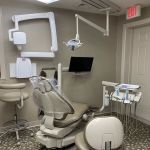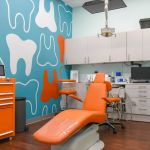What to Expect During a Dental Check-Up Appointment
Regular dental check-ups are essential for maintaining optimal oral health, but many people feel nervous or unsure about what to expect during these appointments. Whether you're visiting a dentist for the first time or it's been a while since your last appointment, understanding the process can help alleviate any concerns. In this article, we’ll walk you through what to expect during a dental check-up appointment and why it’s crucial for your long-term dental health.
- 1. Initial Assessment and Consultation
- 2. The Professional Cleaning Process
- 3. The Dental Examination
- 4. X-Rays and Other Tests
- 5. Post-Appointment Care and Recommendations
1. Initial Assessment and Consultation
The moment you step into the dental office, the first thing that will happen is the initial assessment. This part of the appointment is important because the dentist will gather information about your oral health, your medical history, and any previous dental issues you may have experienced. It’s common for the dentist to ask about your current dental hygiene routine and if you’re experiencing any pain or discomfort in your teeth or gums.
This consultation sets the stage for the rest of the appointment and ensures that the dentist understands your specific needs. It also gives you a chance to ask questions or address any concerns you may have, such as whether you need braces or are considering teeth whitening.
2. The Professional Cleaning Process
One of the main components of a dental check-up is the professional cleaning. A dental hygienist will use specialized tools to remove plaque and tartar buildup from your teeth. Even with diligent brushing and flossing, plaque can accumulate in hard-to-reach areas, leading to cavities and gum disease. The cleaning process typically includes scaling (removal of tartar) and polishing to leave your teeth feeling smooth and fresh.
If you haven't had a cleaning in a while, you might experience a bit of discomfort, especially if there is significant plaque buildup. However, it’s important to note that this step is essential in preventing future dental problems, and it’s always best to follow through with regular cleanings every six months.
3. The Dental Examination
Once the cleaning is complete, the dentist will conduct a thorough examination of your mouth. This includes checking for cavities, gum disease, tooth decay, and any other signs of oral health issues. During the exam, the dentist may use a small mirror and probe to carefully inspect your teeth and gums. The goal is to identify problems early before they progress into more severe conditions.
In addition to looking for cavities and decay, the dentist will also examine the condition of any fillings, crowns, or other dental work you've had in the past. If you need any restorative procedures like fillings or crowns, the dentist will discuss your options with you and recommend the best course of action.
4. X-Rays and Other Tests
In some cases, your dentist may recommend taking X-rays during your check-up. X-rays allow the dentist to look beneath the surface of your teeth and gums, helping to identify issues that aren’t visible during a routine exam. For example, X-rays can reveal cavities between teeth, issues with the jawbone, and even early signs of oral cancer.
While X-rays are an essential diagnostic tool, your dentist will always consider your individual health before recommending them. If you are pregnant or have any concerns about radiation exposure, it’s important to mention this to your dentist so that they can take precautions or adjust the X-ray frequency as needed.
5. Post-Appointment Care and Recommendations
After the check-up and cleaning, your dentist will provide recommendations based on your oral health. If they find any areas of concern, they may suggest further treatment or refer you to a specialist. They might also provide tips for improving your daily oral hygiene routine, such as switching to a different toothpaste, incorporating flossing into your routine, or using a mouthwash that targets specific issues like gum disease or bad breath.
For those who require restorative treatments, such as fillings or teeth whitening, the dentist will discuss the options available to you and explain the benefits and risks of each procedure. Depending on the situation, you may schedule another appointment for more extensive work or follow-up visits.
Regular dental check-ups are essential for keeping your teeth and gums healthy. If you're due for a visit, don't hesitate to schedule your appointment. Dentistry Toothtruth offers comprehensive dental care and expert advice to ensure your smile stays bright and healthy. Visit Dentistry Toothtruth to learn more or book your next dental check-up today!







 Contemporary Dentistry4.0 (46 review)
Contemporary Dentistry4.0 (46 review) Richmond Pediatric Dentistry and Orthodontics4.0 (53 review)
Richmond Pediatric Dentistry and Orthodontics4.0 (53 review) Dr. Maha Blaibel, DDS5.0 (6 review)
Dr. Maha Blaibel, DDS5.0 (6 review) Lawndale Christian Health Center Dental Clinic2.0 (34 review)
Lawndale Christian Health Center Dental Clinic2.0 (34 review) Dentists of South Pasadena4.0 (124 review)
Dentists of South Pasadena4.0 (124 review) Shiney Smiles Orthodontics5.0 (165 review)
Shiney Smiles Orthodontics5.0 (165 review) The Importance of Oral Health Education During Pregnancy for a Healthy Pregnancy
The Importance of Oral Health Education During Pregnancy for a Healthy Pregnancy Best Tips for Brushing Your Teeth Properly for Healthy Gums: Essential Techniques for Oral Health
Best Tips for Brushing Your Teeth Properly for Healthy Gums: Essential Techniques for Oral Health Why Skipping Dental Checkups Can Lead to Bigger Oral Health Problems
Why Skipping Dental Checkups Can Lead to Bigger Oral Health Problems Advantages of Porcelain Dental Restorations
Advantages of Porcelain Dental Restorations How Can Diabetes Cause Tooth and Gum Problems? Preventing and Managing Oral Health Issues
How Can Diabetes Cause Tooth and Gum Problems? Preventing and Managing Oral Health Issues Healthy Habits for Promoting Good Oral Health and Hygiene: Tips for a Healthy Smile
Healthy Habits for Promoting Good Oral Health and Hygiene: Tips for a Healthy Smile